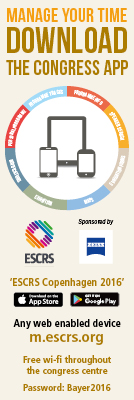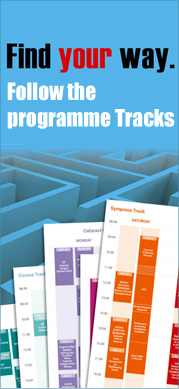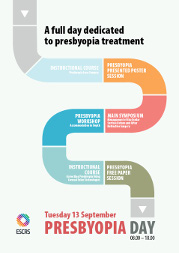Laser blended vision: LASIK for presbyopia and clinical experience in 200 patients
Session Details
Session Title: LASIK
Session Date/Time: Monday 12/09/2016 | 08:00-10:30
Paper Time: 10:12
Venue: Hall C3
First Author: : K.Koodlu INDIA
Co Author(s): : T. Suchi Smitha S. Shetty H. Vokudu S. Ganekal
Abstract Details
Purpose:
To evaluate the monocular and binocular visual outcomes of LASIK with a non-linear aspheric micro-monovision protocol for the correction of myopia, myopic astigmatism, hyperopia with presbyopia.
Setting:
Prasad Netralaya Private Super Speciality Tertiary Eye Hospital, India
Methods:
A prospective, non-comparative case series which included 400 eyes of 200 consecutive patients with myopia, myopic astigmatism, hyperopia with presbyopia who were treated with LASIK using the laser blended vision protocol(Carl Zeiss). CRS-Master software and MEL 80 excimer laser (Carl Zeiss Meditec,Germany) were used for the study. The target refraction was plano for distance eyes (dominant eye) and between -1.25 and -1.75 diopters (D) for near eyes. The study included myopes (-0.25 to-7.25DS), hypermetropes(0.25 to 2.5DS)and emmetropic presbyopes between ages 39 to 55 yrs(mean 47) and a followup period of minimum1 year. astigmatism between -0.25 to -2.75 DC included.
Results:
Achieved Spherical equivalent correction was within -0.50 D in 92% and within -1.00 D in 100% of eyes at1year . Monocular uncorrected distance visual acuity was 20/20(6/6) atleast in 70%, 20/32(6/9) atleast in 98%. Binocularly 80% read 6/6 atleast and 100% read 6/9. Binocular uncorrected near visual acuity was N8 in 3% and N6 in 97%of patients. None of the eyes lost 1 or more lines of corrected distance visual acuity.
Conclusions:
The non-linear aspheric micro-monovision protocol was well-tolerated, stable in 1 year , and a safe treatment option in patients with presbyopia and myopia , myopic astigmatism and hyperopia. Stability of refraction and results over longer duration need to be studied.
Financial Disclosure:
NONE





